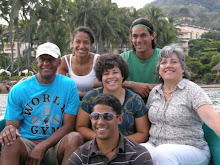The rain drips and lightly patters the tin roofs all day long. The large tropical leaves hold a permanent glaze as droplets of water peal off their waxy tops. I sit in this paradise that is my back yard and marvel at the shades of vibrant green. Massive vines stretch towards the heavens and golden colored mangos droop from spidery limbs as if they were Christmas ornaments adorning every patio. Sometimes I forget so much is going on in the 10 foot radius from where I sit. Leaves are breathing; trunks are expanding; larva is multiplying; beetles are nibbling; roots are drinking, mangos are ripening, mangos are decomposing. It’s ever changing and forever unique. I happily make these observations from the kiosk behind my house… the place I call home.
Not so far away on the other side of the mountains there is a desert; a dry flat landscape where vibrant greens are only seen the land is generously irrigated. I spent a week this past month in the southern part of the island surrounded by fields of towering sugar cane. I was learning Creole through a special Peace Corps language course that took volunteers to the communities where the Creole speakers in this country live. Batey 9 was home for 5 days; immersed in a community of some of the poorest families in the Dominican Republic. “Poor,” not because they are helpless or weak people. “Poor,” because they live in an intentional sugar cane community that has denied them an identity. The consortiums, or large sugar cane companies, imported cheap labor from Haiti over a century ago when slave labor was an acceptable practice. As servants to the land, the Haitian men lived in barrack like facilities directly next to the large fields of sugar cane. Over the years they had families adapted their cultural upbringing to the new situation. A version of Voodoo was celebrated, they sang their own songs, made instruments from bamboo, cooked their style food, and spoke their own language, Creole.
However, this cultural identity brought from Haiti, rooted in the West African lifestyle, was greatly compromised by the labor intensive job these men were required to perform. They made almost no money hacking down large stocks of sugar cane with their machetes as the cane husk was lit a flame in front of their eyes. They were required to work 12 days straight on 12 hour shifts and then the 13th day was 24 hours straight before they received one day off and repeated the cycle again. They were isolated in a lifestyle that was not just. When the sugar industry fell in the mid 20th century these men and their families were left without an income source. At least during the time of their indentured servitude they were paid a living stipend.
Today, multiple generations later and the current situation in 2011 is much more complex and difficult. These people own no land, not even their house, as these Bateys are still privately owned by the sugar cane companies. They are not recognized as Dominican citizens, and thus cannot legally attend high school or college, they have very few job opportunities, cannot vote, cannot travel outside their community without being harassed at military checkpoints along the highway, nor are they accepted across the Haitian border because they were not born there. These people are marginalized from society. They belong to no nation. The same story could be played out in the farming rich San Joaquin Valley of California where hard working Mexican farm workers have been imported and accepted as cheap labor to maintain the strong agricultural economy. However, you can imagine that conditions and opportunities are magnified to even a greater level of discomfort on the Dominican-Haitian border where the standard of living is much lower.
So no one has ever accused me of being an immigrant lawyer, but I constantly have to peal back the lens of privilege through which I was born into the world and understand the multiple layers to inequality. I went to Batey 9 to learn Creole and walked away with a brief understanding of a history and reality that is not just. The developing world is changing rapidly, just as the trunks of trees and vibrant green leaves in my back yard are expanding with each new drop of rain. I am hopeful that maybe the bright smiles of the children in Batey 9 that I shared every afternoon playing soccer with will one day claim their rights to be active, participating citizens in this world. They deserve an identity just like you and me.
Friday, June 3, 2011
Subscribe to:
Comments (Atom)
